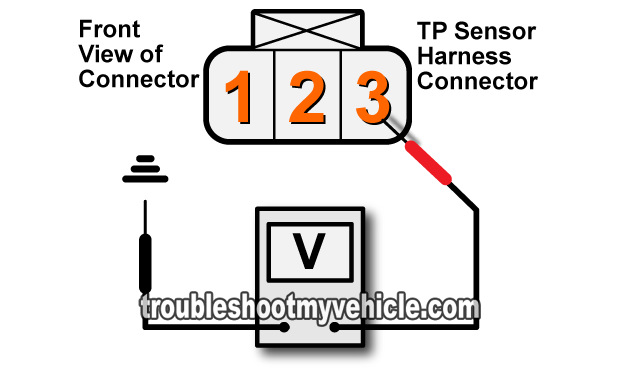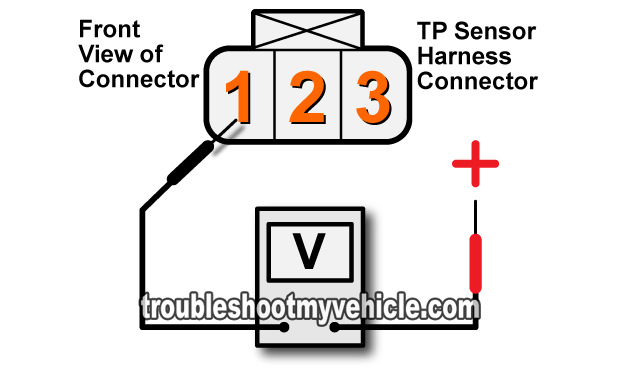TEST 2: Making Sure The TPS Is Getting Power

The throttle position sensor on your 3.3L equipped Chrysler mini-van gets power on the PNK/YEL (pink/yellow) wire of the sensor's harness connector.
In this test section, you'll unplug the throttle position sensor from its harness connector and check to see if this wire is delivering this power (which is in the form of 5 Volts DC).
NOTE: Don't probe the front of the throttle position sensor's harness connector to check for this voltage, or you run the risk of damaging the connector's terminal. You should either back-probe the connector or use the wire piercing probe.
With the multimeter in Volts DC mode, this is what you need to do:
- 1
Connect the red multimeter test lead to the PNK/YEL wire of the TPS harness connector
This is the wire that connects to the terminal labeled with the number 3. - 2
Ground the black multimeter test lead directly on the battery negative (-) terminal.
- 3
Have a helper turn the key to the On position, but don't crank or start the engine after the multimeter test leads have been set up.
- 4
Your multimeter should register 4.5 to 5 Volts DC if the PNK/YEL wire is feeding the throttle post ion sensor (TPS) with power.
Let's take a look at what your test results mean:
CASE 1: The multimeter registered 4.5 to 5 Volts DC. This is the correct and expected test result.
Your next step is to make sure that the TPS is getting Ground on the DK BLU/DK GRN (dark blue/dark green) wire. For this test, go to: TEST 3: Making Sure The TPS Is Getting Ground.
CASE 2: The multimeter DID NOT register 4.5 to 5 Volts DC. Re-check your multimeter test lead connections and re-test. If the multimeter still does not show the indicated voltage, then you've found the reason why the TPS did not create a voltage signal in TEST 1.
Although it's beyond the scope of this tutorial to find the reason why these 5 Volts are missing, you'll need to get yourself a wiring diagram (for your particular mini-van) and check the continuity of this wire between the TPS and the PCM.
TEST 3: Making Sure The TPS Is Getting Ground

If you've reached this point, you have confirmed that the TPS is:
One: Not creating an increasing/decreasing voltage signal (TEST 1).
Two: Getting power on the PNK/YEL wire of its harness connector (TEST 2).
Now, you'll check to see if the TP sensor is getting Ground on the dark blue with dark green stripe (DK BLU/DK GRN) wire of its harness connector.
To verify this Ground, we'll do a simple multimeter voltage test.
These are the test steps:
- 1
Connect the black multimeter test lead to the DK BLU/DK GRN wire of the TPS harness connector
This is the wire that connects to the terminal labeled with the number 1. - 2
Connect the red multimeter test lead directly on the battery's positive (+) terminal.
- 3
Have a helper turn the key to the On position, but don't crank or start the engine after the multimeter test leads have been set up.
- 4
Your multimeter should register 10 to 12 Volts DC if the DK BLU/DK GRN wire is feeding the throttle post ion sensor (TPS) with G.
Alright, let's find out what your test results mean:
CASE 1: The multimeter registered 10 to 12 Volts DC. This is the correct and expected test result. It confirms that the TPS is getting Ground.
You can conclude that the TPS is bad and needs to be replaced if you have:
- Confirmed that the TPS is not creating a throttle plate angle voltage signal (TEST 1).
- Confirmed that the TPS is getting power (TEST 2).
- Confimred that the TPS is getting Ground in this test section.
CASE 2: The multimeter DID NOT register 10 to 12 Volts DC. Re-check your multimeter test lead connections and re-test. If the multimeter still does not show the indicated voltage, then you've found the reason why the TPS did not create a voltage signal in TEST 1.
Although it's beyond the scope of this tutorial to find the reason why this Ground is missing, you'll need to get yourself a wiring diagram (for your particular mini-van) and check the continuity of this wire between the TPS and the PCM.
More 3.3L Chrysler Mini-Van Tutorials
You can find a complete list of tutorials in this index: Chrysler 3.3L Index Of Articles.
- How To Test The MAP Sensor (Chrysler 3.3L).
- How To Test The Alternator (2001-2007 3.3L Chrysler).
- How To Test Engine Compression (1991-2007 3.3L V6 Chrysler, Dodge, Plymouth Mini-Van).
- How To Test The Coil Pack 3.3L, 3.8L Chrysler, Dodge, Plymouth (at: easyautodiagnostics.com).

If this info saved the day, buy me a beer!

